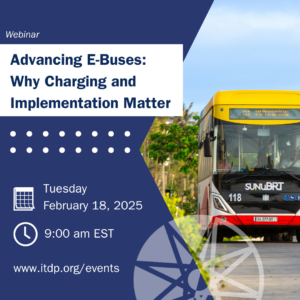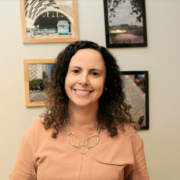Webinar

Join us for the publication launch webinar of “Advancing E-Buses: A Guide to Batteries and Charging.” This webinar will delve into key aspects of defining and implementing charging strategies for e-buses, including infrastructure requirements and their impact on service planning, operations, and long-term costs.
Learn from city case studies and expert insights about innovative approaches to slow, fast, and mixed charging methods. Understand the broader implications for energy networks, sustainability, and operational efficiency as we discuss strategies to overcome common challenges and maximize benefits. This session is essential for urban planners, transport officials, and stakeholders looking to implement sustainable, effective e-bus charging solutions.
This event will feature live interpretations in Portuguese, Chinese, Bahasa, French and Spanish.

Aditya Rane is an Architect and Transport Planner with over eight years of experience in Public Transport Planning, Electric Mobility, and Transport Infrastructure. His expertise spans public transit improvement, station design, metro and BRT planning, fleet electrification strategies, and comprehensive mobility plans, helping cities transition toward sustainable and efficient transport solutions.
As a Senior Associate at ITDP India, he plays a crucial role in supporting public transit agencies and private bus operators at local, state, and national levels in their electrification efforts. His work includes route planning, cost-benefit analysis, financial assessment, and business model development, guiding agencies toward scalable and economically viable e-bus adoption.
Aditya provides strategic knowledge support to key stakeholders, including public transit agencies and their apex body, the Association of State Road Transport Undertakings (ASRTU), as well as the Bus & Car Operators Confederation of India (BOCI). Together, these entities represent over 2 million buses, collectively transporting 32 million passengers daily. His contributions drive policy development and implementation, shaping India’s evolving e-mobility landscape.
Committed to fostering collaboration across the public and private sectors, his work accelerates the shift toward cleaner, more efficient, and future-ready public transport systems.

Pedro is an Associate Researcher at the ICCT São Paulo office, contributing in the Zero Emission Bus Rapid-deployment Accelerator (ZEBRA) initiative, which is committed to transforming the Latin American bus market to zero emissions. Before joining ICCT, Pedro specialized in spatial big data analysis at SPTrans, the municipal public transport agency in São Paulo, Brazil. He also served as a consultant at the World Bank Group (WB and IFC), where he was involved in public transportation projects. He holds both a master’s degree in Transportation Engineering and a bachelor’s degree in civil engineering from the University of São Paulo (USP). Throughout his academic journey, he delved into research on urban transport, with a keen focus on inequality and justice.

Daniela has over 10 years of experience in both public and private sectors with a focus on energy and the environment. The greatest part of her professional career has been focused on designing and implementing public policies around these two topics. In her current role at the Yucatán Transportation Agency, she oversees strategic projects for the region, including electric mobility and the implementation of information technologies in the design of mobility and urban development policies.
She holds a master’s degree in Energy and Environmental Policy and Management from the Latin American Faculty of Social Sciences (FLACSO), a master’s degree in Urban Studies from El Colegio de México, and a bachelor’s degree in Economics from the Instituto Tecnológico Autónomo de México (ITAM).


Mukteshwar Joshi is the Divisional Controller at MSRTC, bringing with him vast experience in operating and managing buses right from the ground level. Having started his journey as a Depot Manager, he has gained deep insights into the challenges and intricacies of public transport operations, fleet management, and service optimization.
With his extensive hands-on experience, he has played a pivotal role in the planning and execution of MSRTC’s 5150 E-Bus Project, ensuring a smooth transition to electric mobility across rural and intercity routes. His expertise spans route selection, depot electrification, viability gap funding, and financial planning, making him a key figure in MSRTC’s shift towards sustainable transport.
Under his leadership, MSRTC has demonstrated the feasibility of electric buses beyond urban areas, optimizing charging infrastructure and leveraging policy support for large-scale deployment. His deep operational knowledge and strategic vision make him a valuable voice in shaping the future of intercity and long-distance e-bus operations.